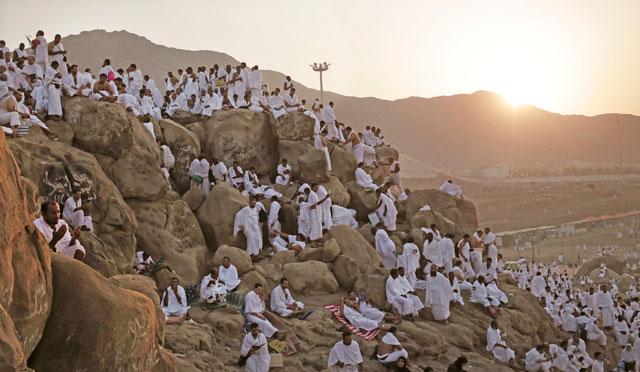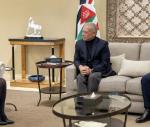You are here
Iran-Saudi Arabia war of words heats up over Hajj disaster
By AFP - Sep 27,2015 - Last updated at Sep 27,2015

Pilgrims leave after throwing pebbles at pillars during the ‘Jamarat’ ritual, the stoning of Satan, in Mina near the holy city of Mecca, on Thursday (AFP photo)
RIYADH — Iran's supreme leader Ayatollah Ali Khamenei demanded Saudi Arabia apologise Sunday for a stampede that killed 769 pilgrims at the Hajj, the greater Muslim pilgrimage to Mecca, as a war of words escalated between the regional rivals.
Khamenei accused Riyadh of "a blame game", after the Saudi foreign minister said Iran was playing politics with tragedy.
"Instead of passing the buck and playing a blame game, the Saudis should accept their responsibility and apologise to the world's Muslims and the bereaved families," Khamenei said in comments reported by Iran's official IRNA news agency.
About 400 protesters later chanted "Death to the treacherous House of Saud" outside the Saudi embassy in Tehran.
Iranian leaders have been fiercely critical of Saudi authorities' handling of safety at the Hajj, following Thursday's stampede during a ritual stoning of the devil in Mina, near the holy city of Mecca.
Within hours, Khamenei blamed "improper measures" and "mismanagement" for the disaster.
At least 144 Iranians died in the crush — the highest confirmed toll among foreign nationalities. Tehran says 323 Iranians are missing.
Iranian President Hassan Rouhani, addressing a UN development summit in New York on Saturday, said he wanted to "emphasise the need for swift attention to the injured as well as investigating the causes of this incident and other similar incidents in this year's Hajj."
Saudi Foreign Minister Adel Al Jubeir, also in New York for the UN General Assembly, said the Iranians "should know better than to play politics with a tragedy that has befallen people who were performing their most sacred religious duty".
Saudi King Salman, whose official title is "Custodian of the Two Holy Mosques" in Mecca and Medina, ordered "a revision" of how the Hajj is organised, and a formal Saudi inquiry is under way into the stampede.
It was the worst disaster to strike the annual pilgrimage in a quarter-century.
"We will reveal the facts when they emerge. And we will not hold anything back," Jubeir said, adding the kingdom has a long history of devoting "tremendous resources" to ensuring a successful pilgrimage.
"I would hope Iranian leaders would be more sensible and more thoughtful with regards to those who perished in this tragedy, and wait until we see the results of the investigation."
Yemen, Syria tensions
Relations between Shiite Iran and Sunni-dominated Saudi Arabia were already severely strained by conflicts in Yemen and Syria, and an international agreement on Iran's nuclear programme.
It is also not the first time Iranian pilgrims have been killed in Saudi Arabia. In 1987 Saudi security forces suppressed an unauthorised protest by Iranian pilgrims. An official toll gave the death toll as more than 400, including 275 Iranians.
Iran has demanded that affected countries have a role in the stampede investigation, and on Friday Ayatollah Mohammad Emami Kashani said the running of the Hajj "must be handed over to Islamic states".
Such suggestions are "frankly ridiculous", columnist Rasheed Abou-Alsamh wrote in Sunday's Arab News, an English-language Saudi daily.
He said criticism of the kingdom's Hajj organisation is part of a "concerted campaign of defamation against Saudi Arabia by its enemies".
The Saudi Press Agency over the weekend started a Twitter account, @spa_persian, to transmit official information in the Iranian language Farsi.
Senior Saudi officials suggested the pilgrims were at fault for not following instructions.
The interior ministry has said it assigned 100,000 police to secure the Hajj and manage crowds at the event, which drew almost 2 million faithful.
But pilgrims blamed the stampede on police road closures and poor crowd management, during searing temperatures.
Hundreds of thousands of pilgrims were converging on a five-storey structure known as Jamarat Bridge to perform the stoning ritual when the stampede happened nearby.
"The police blocked all the roads, leaving us with only one route," said Hamza Musa Kabir, 55, of Kano, Nigeria.
Kabir was in a procession heading towards the Jamarat Bridge when, he said, police let pilgrims returning from the stoning site use the same route.
"Because those returning were moving in the opposite [direction] of the surging crowd, there was a stampede," said Kabir, who became trapped under another man and had to disrobe to escape.
The stampede was the second tragedy to cast a pall over this year's Hajj.
A massive construction crane collapsed on Mecca's Grand Mosque several days before and killed 109 people, many of them pilgrims.
For years, the Hajj was marred by stampedes and fires, but it had been largely incident-free for almost a decade after safety improvements and billions of dollars' worth of infrastructure investment.
Related Articles
RIYADH — Saudi Arabia's shura council recommended Monday an expansion of roads leading to the site of a ritual in the annual Hajj pilgrimage
MOUNT ARAFAT — The Hajj reached its high point Sunday when Muslims from across the world converged on a stony hill in Saudi Arabia, a year a
CAIRO — Arab foreign ministers weighed in Thursday on a bitter dispute between Tehran and Riyadh over the Hajj (the greater Muslim pilgrimag

















